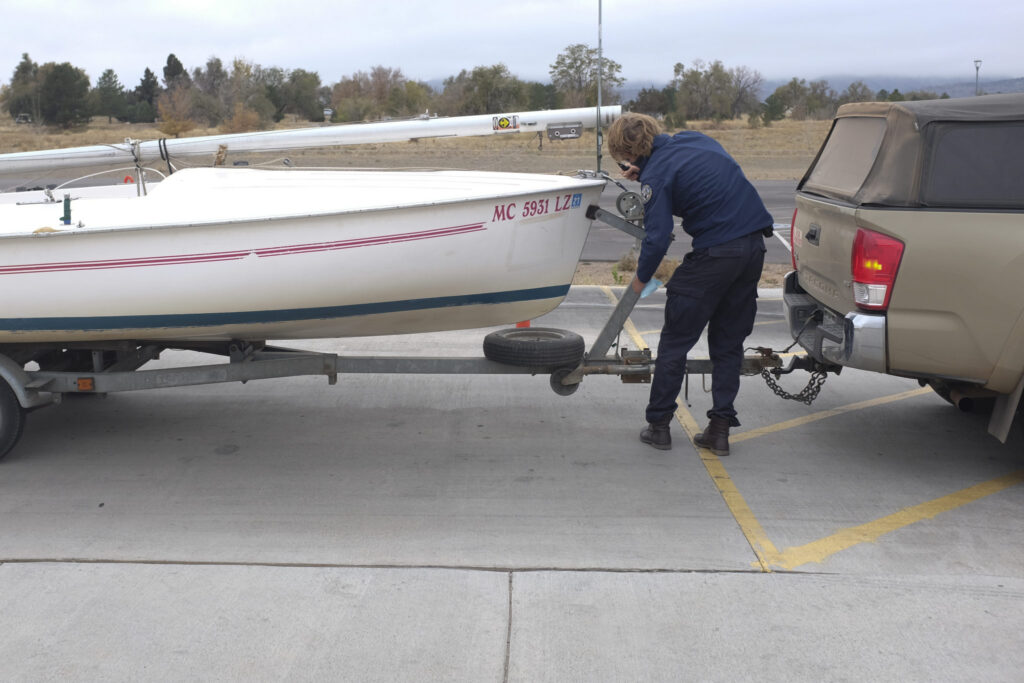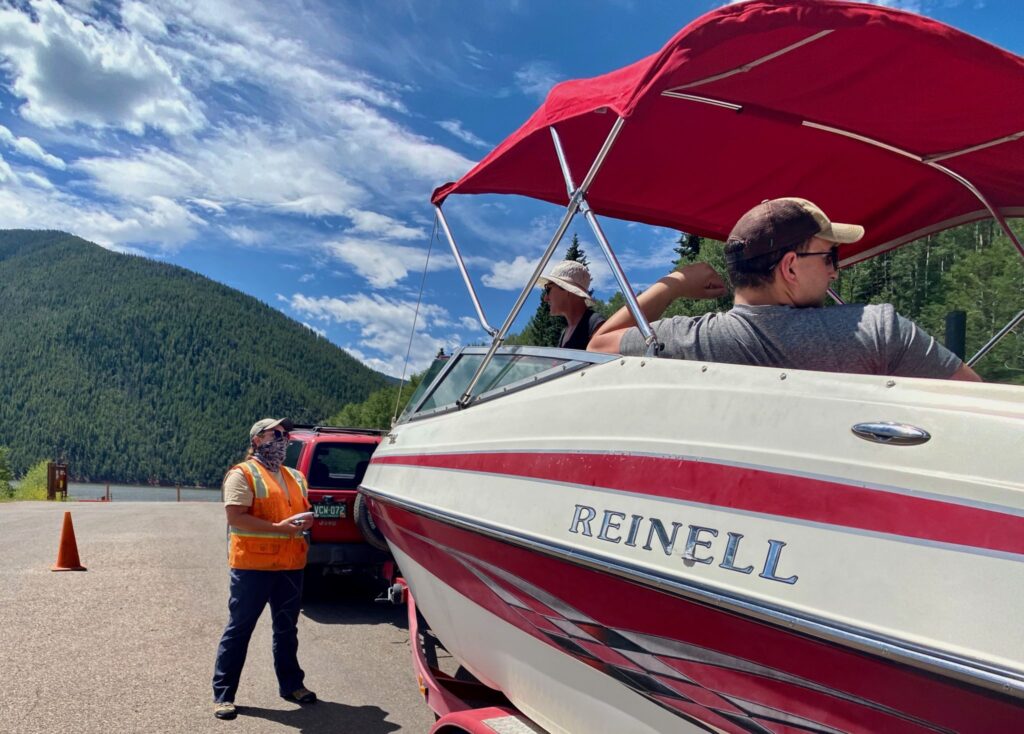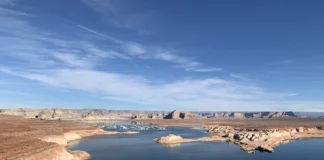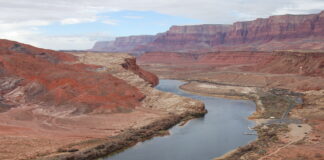
Inspectors in Colorado this season intercepted a record number of watercraft showing signs of invasive mussel infestations as reservoirs across the state saw surging numbers of boaters.
Ruedi Reservoir, near Basalt, recorded the state’s highest number of intercepted boats carrying mussels. Officials said that is probably due to the reservoir’s relative proximity to Utah’s Lake Powell, which has been dealing with a mussel infestation for years.
As public health experts have urged people to maintain their distance and avoid enclosed spaces during the COVID-19 pandemic, one logical response for many Coloradans has been to take to the water. Boating, kayaking and paddleboarding have exploded in popularity this year, according to reservoir managers across the state. Riding the wave of that trend are invasive mussels, attaching themselves to watercraft.
“With more opportunities … for a boat to be transporting something into our waters, there is, of course, a little bit more risk,” said Robert Walters, an invasive-species specialist with Colorado Parks and Wildlife.
By mid-September in Colorado, where the boating season officially will close in November, the state had already recorded more than 600,000 boat inspections. In an average year, it conducts about 475,000. At least 94 boats were intercepted with confirmed adult mussels, the highest number recorded in the state since it began boat inspections in 2008.
Native to Eastern Europe, zebra and quagga mussels have infested waters around the world. The creatures, each wrapped in a hard, sharp shell, cling to surfaces in fresh water and quickly breed. Mussels can devastate aquatic ecosystems and damage infrastructure such as pipes and hydroelectric equipment. The larvae of these aquatic nuisance species — as they are designated by the state — have been detected in several Colorado reservoirs over the years, but adult mussels have never emerged.
Mussels pose a particularly high threat in Colorado because of the state’s position upstream of other watersheds. Scientists suspect that zebra and quagga mussels would have difficulty establishing in a high-elevation river, but it’s still possible that they could be distributed downstream.
“We are at the top of the watershed,” Walters said. “So if something were to happen in one of our headwaters or really anywhere in the state of Colorado, it would have significant potential to impact those downstream of us.”

Keeping up with the crowds
CPW regularly tests the state’s reservoirs for mussel larvae, and so far there are no signs that the increased boating activity has spurred an infestation, which is a testament to the state’s thorough inspection program. Still, keeping pace with the increased boat inspections has been a challenge for many agencies, especially those dealing with pandemic-induced budget constraints.
“I think we’re pretty fortunate that we were even allowed to hire our normal staffing,” said Mark Caughlan, district manager at Horsetooth Reservoir, just west of Fort Collins. “But don’t get me wrong, it still wasn’t enough staffing to handle that massive influx of visitation that we saw.”
According to Caughlan, Horsetooth Reservoir normally gets around 1.2 million visitors a year. This year, the reservoir saw a 30% to 40% increase in visitation, much of which was boaters. The volume of visitors, the limited staff and the need to carefully inspect boats meant that some people waited hours to get on the water. Most reservoirs, including Horsetooth, put inspection stations at every boat ramp, making it improbable that any boat will touch the water before it’s checked out.
Adult mussels can stick to the outside of a boat or be sucked into the ballast tanks of wakeboard boats and ski boats. If mussels are found, inspectors spray the boat with a high-powered water jet to clear them off. The ballasts have to be emptied and washed to ensure that no larvae are inside. The full decontamination process can take up to 30 minutes depending on the extent of the infestation.
Even before boating exploded in popularity during the pandemic, the threat of mussels slipping through the cracks was increasing. In 2017, CPW intercepted 26 infested boats, which was a record at the time. That number increased to 51 in 2018 and to 86 in 2019.
Reservoir managers attribute the increase to surrounding states’ growing number of bodies of waters with mussel infestations, in particular Lake Powell, which became fully colonized by mussels in 2016. Boats leaving Lake Powell are required to undergo inspection by the National Park Service, but many boats slip through. Nearly 70% of the mussel-infested boats intercepted in Colorado come from Lake Powell.

Ruedi on the frontlines
The impact of Lake Powell’s mussel colonies on Colorado is most striking at reservoirs closest to the Utah border. Ruedi Reservoir, in the Fryingpan River Valley above Basalt, has seen more boats containing invasive mussels than any other body of water in Colorado, with 17 interceptions this year. Ruedi is particularly vulnerable to mussels. The turbines and pipes inside its hydroelectric dam are difficult to clean and could be destroyed if they are colonized. Mussels are also a filtering species, meaning they feed off the microinvertebrates, such as plankton, in their ecosystem. These microinvertebrates make up the base of the food chain, which helps sustain the renowned fishery downstream of the reservoir on the Fryingpan River.
“Given our proximity, I think we share a lot of the same boaters with Lake Powell,” said April Long, executive director at Ruedi Water and Power Authority. “Their mussel population is increasing, and I don’t believe that their ability to inspect is also increasing.”
Due to the pandemic, Ruedi delayed opening to boaters until June 1, but Long said the number of boats inspected there has still nearly doubled in 2020. Inspectors worked overtime hours through June and July to keep up.

Most boaters are cooperative — and officials want to keep it that way
Despite the long waits, inspectors across the state say most boaters are cooperative. Long worries that this could change if long lines become the norm, and she said the RWPA is discussing expanding its inspection staff next year.
“If they get frustrated with the amount of time that it takes to do these inspections or decontaminations, we may see some compliance shift to noncompliance,” she said. “We don’t want that to happen.”
While long lines could aggravate some boaters, Walters said boaters, generally, are invested in keeping the waters where they spend time healthy. The mussel colonies at Lake Powell have served as a firm warning for many Colorado boaters.
“If there is anything positive that I can say of the infestation out there at Lake Powell,” he said, “it’s that Colorado boaters love to go out there and seeing something like that happen to one of their favorite waters has really hammered home what this could potentially look like if it happened here in Colorado. From what I’ve seen, I think that’s made the boaters much more supportive of the program and that they don’t want to see that happen at their home waters.”
This story ran in the Oct. 24 edition of The Aspen Times and the Oct. 26 edition of the Glenwood Springs Post Independent.
This story was supported by The Water Desk using funding from the Walton Family Foundation.
The Water Desk’s mission is to increase the volume, depth and power of journalism connected to Western water issues. We’re an initiative of the Center for Environmental Journalism at the University of Colorado Boulder. The Water Desk launched in April 2019 with support from the Walton Family Foundation. We maintain a strict editorial firewall between our funders and our journalism. The Water Desk is seeking additional funding to build and sustain the initiative. Click here to donate.





